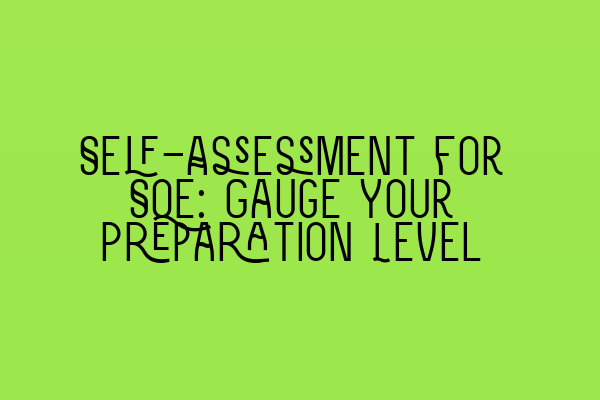Self-Assessment for SQE: Gauge Your Preparation Level
Are you gearing up for the Solicitors Qualifying Examination (SQE) but unsure about your level of preparation? Taking a self-assessment is a great way to gauge your readiness for the exam and identify areas where you might need to focus more. In this article, we will explore the importance of self-assessment for SQE preparation and provide you with valuable tips to make the most out of this process.
Why is Self-Assessment Essential for SQE Preparation?
Self-assessment allows you to evaluate your knowledge and skills in the relevant areas of law that will be tested in the SQE. It helps you identify your strengths and weaknesses, enabling you to allocate your time and resources efficiently. By understanding your current level of preparedness, you can tailor your study plan and focus on the topics that require more attention.
Moreover, self-assessment helps you build confidence and reduce exam anxiety. By taking mock tests and evaluating your performance, you can familiarize yourself with the format and structure of the exam, which in turn boosts your confidence on the day of the actual test.
Now, let’s delve into the steps you can follow to conduct a thorough self-assessment for SQE preparation.
Step 1: Identify the Tested Topics
The first step is to familiarize yourself with the topics that will be covered in the SQE. You can refer to the official syllabus or use reliable study materials to gain a comprehensive understanding of the areas of law that will be tested. This will help you create a roadmap for your self-assessment journey.
For instance, if you’re preparing for the Property Practice module, you can check out the related article on SQE Prep: Essential Tips and Resources for Success in Property Practice for additional guidance.
Step 2: Take Interactive Mock Tests
Interactive mock tests are invaluable resources for self-assessment. They simulate the actual exam environment and allow you to test your knowledge and skills under timed conditions. Taking mock tests will give you a clear idea of your strengths and weaknesses, as well as highlight any gaps in your understanding of the subject matter.
If you’re focusing on the Property module specifically, you can enhance your self-assessment process by trying out the Interactive SQE Mock Tests for Property: Sharpen Your Skills for Exam Success.
Step 3: Analyze Your Performance
After taking a mock test, it’s crucial to analyze your performance. Look for patterns in the questions you answered incorrectly or struggled with. This analysis will help you understand the specific areas where you need to improve.
For example, if you find that you’re consistently struggling with questions related to land charges, you can gain a deeper understanding by reading the article on Examining Land Charges: Implications and Considerations.
Step 4: Create a Study Plan
Once you have identified your strengths and weaknesses, it’s time to create a study plan. Allocate more time for the topics that you find challenging and set specific goals for each study session. By having a structured plan in place, you can efficiently utilize your study time and ensure comprehensive coverage of all the tested areas.
For a detailed exploration of residential leases, a crucial topic within the Property Practice module, refer to the article on An In-Depth Look at Residential Leases.
Step 5: Seek Additional Help if Needed
If your self-assessment reveals significant gaps in your understanding or you are struggling with certain topics, don’t hesitate to seek additional help. Reach out to tutors, mentors, or join study groups where you can discuss challenging concepts and gain insights from others.
For co-owners of property, the article on Joint Ownership: Legal Considerations for Co-Owners of Property provides valuable information that can assist you in refining your knowledge within the Property Practice module.
In Conclusion
Self-assessment is a vital component of SQE preparation that allows you to evaluate your readiness for the exam. By identifying your strengths and weaknesses, analyzing your performance, and creating a tailored study plan, you can optimize your preparation and increase your chances of success.
Remember, the key to effective self-assessment is regular practice, continuous learning, and seeking help when needed. Embrace this process as an opportunity to grow and refine your skills, and you’ll be well on your way to confidently tackling the SQE.

Leave a Reply